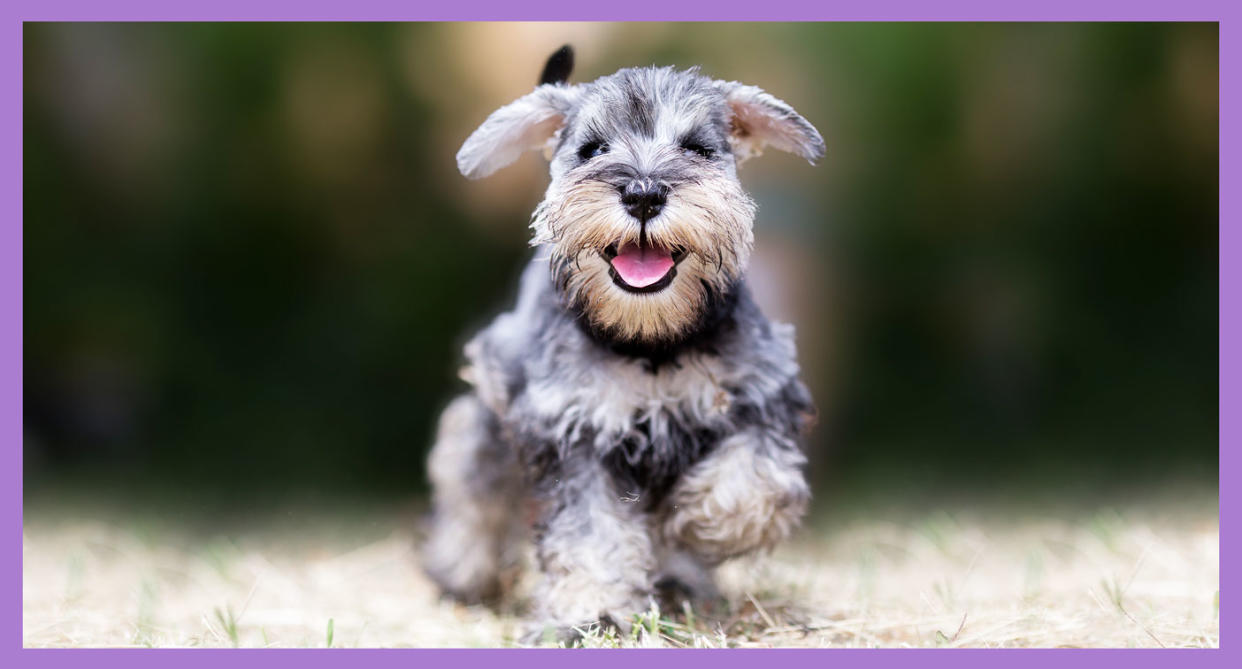How I, an anxious person, deal with an anxious puppy

One thing no one ever told me about bringing home a sweet little puppy was the chance that they could suffer from anxiety. “Dogs can have anxiety?”, I asked myself the first time I started Googling my miniature schnauzer’s symptoms. For close to three months, it felt that nothing could soothe my puppy, no matter how much love and affection I was giving to him.
“Anxiety in pets is something I see very often,” Sara Ochoa, DVM, a small animal and exotic veterinarian based in Texas, tells Yahoo Lifestyle. “Many dogs are afraid of loud noises such as fireworks and thunderstorms. Some have separation anxiety when their owners leave. Some have anxiety all the time.”
That’s where I was with one of my puppies, Piglet, who seemingly couldn’t let me out of his sight for a second before bewildering cries would erupt that could go on for hours. If I left the room, he would begin to cry. When it was time for bed, he would cry. When it would rain loudly, he would cry.
As an anxious person myself, seeing my puppy restlessly howl and cry throughout the night would only heighten my emotions and leave me to wonder what I could do to help. It especially concerned me that Piglet was so codependent on me considering that his sister, Sky, never showed signs of anxiety. “Did I do something wrong?” “Would people think I was making this up?” “Does it sound silly to say that my dog has anxiety?” These questions replayed in my head like a daily record; however, puppy anxiety is normal and there are ways to treat the condition.
“There are many different things that veterinarians try to help with anxiety,” explains Ochoa. “Some reach for mild sedatives such as acepromazine. Some will try more of the Prozac-type medication and some will try supplements such as CBD products or calming treats.”
Once I learned that puppy anxiety was more of a widely-known thing in the pet community, I began researching different brands of calming treats and learned that those that are “hemp-infused” seemed to do the trick. I immediately started using the Max calming treats for both Piglet and Sky, and almost immediately their nightly separation anxiety cleared away.
While teaching them that separation is okay, it’s also very important to socialize your puppy with other dogs to curb anxiety, according to Ann Eliopulos, DVM, Wag! advisory board member and veterinarian. “Start training early. Puppies are like little sponges and can learn so much more than we give them credit for,” she says. “As soon as your veterinarian gives the okay, get them out for walks and meet-and-greets with other dogs and people! Socialization skills early on pave the way for a well-adjusted, non-fearful dog. Be aware that puppies cannot protect themselves against bigger, adult dogs. Choose their company safely and wisely.”
Zay Satchu, chief veterinary officer of Bond Vet, a new female-led pet health startup that's opening tech-enabled urgent care and walk-in clinics across the country, agrees that movement and exercise are great techniques for kicking anxiety. She says, “A tired dog is a happy dog. Nothing is truer. Exercise an animal and help them feel tired, and they'll often be happier and brighter, showcasing less anxiety and stress. This is similar in human health as well!”
Now, what about when you’re at work, or working remotely but not able to have a lot of interaction with your little one? Well, Satchu suggests using food motivation and thinking toys to your advantage. “Fill a kong with some wet food, throw it in the freezer and let them work on their popsicle when you leave for the day,” she says. “Once they finish, they'll likely want to take a nap which helps to ease their mind and keep them from getting 'amped' up.”
I found that during the day I could get a lot more things done once Piglet and Sky were down for a nap, and they were both more inclined to do so once they had eaten a big meal or chewed on a bone for an hour. But it’s not just the food that mellows them out, it’s the mental work as well. “There are lots of great puzzle toys on the market,” says Satchu. “Make them work for their treats. The more they think about the toys, the less time they have to think about the things that stress them out!”
And lastly, sometimes you may really need to take a step away and put your anxious puppy on a stronger pharmaceutical. “Sometimes, the nutraceuticals don't cut it and you need to give them anxiety relief with things that help them immediately and in a stronger way,” Satchu tells Yahoo Lifestyle. “These are typically medications that we have often heard of in human medicine. Trazodone, Gabapentin, Xanax, Prozac etc. are some of the medications animals can be placed on that work in a similar fashion as they do in humans. This is a good reason to chat with a veterinarian directly about anxiety and how it affects your pet’s life.”
However, understand that there is nothing wrong if your puppy needs a bit more support beyond the vet-approved recommendations listed here. “For some reason, there is a stigma around these medications for pets and it’s important to recognize that though they're not right for all animals, certain pets have a better quality of life with these on board,” she adds.
Piglet still has his days, but honestly, so does everyone. There is no one solution to curing puppy anxiety, but creating a happy, healthy and safe environment for your puppy to feel loved and supported is a step in the right direction.


